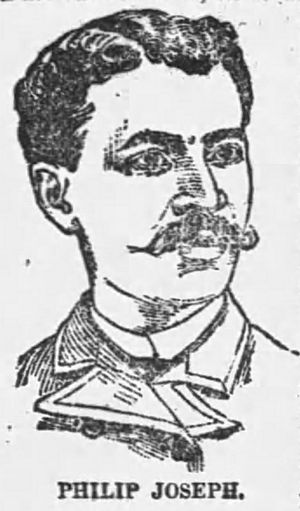Philip Joseph (politician) facts for kids
Philip Joseph was an important African American politician and journalist. He was a member of the Republican Party in Alabama. He lived during the time of Reconstruction and the Jim Crow era.
Contents
Early Life and Education
Joseph was born a free person in 1846 in Florida. His family history included roots in Spain, France, Africa, and Cuba. His mother was the daughter of a wealthy Cuban. She freed the family's many enslaved people. Philip Joseph received a good education. He could speak three languages fluently: French, German, and English.
Working for Change During Reconstruction
The period after the American Civil War was called Reconstruction (1865-1877). During this time, Philip Joseph was very active in civil rights. He was the president of the Mobile Union League. This group worked to protect the rights of African Americans.
In 1869, Joseph tried to ride in a train car meant only for white people in Mobile. He was forced off the train. He then took the train conductor to court. The court case showed that Joseph was treated unfairly. The jury found the conductor guilty and gave him a small fine.
Political Roles and Journalism
Philip Joseph was a delegate to the Republican National Convention in 1868 and again in 1872. This meant he helped choose the Republican candidate for president. In early 1872, he worked as a postal clerk in Mobile. He also worked as a clerk in the Mobile custom house.
Joseph started his career in journalism in 1870. He founded a newspaper called the Mobile Republican. Over the years, he started and edited four newspapers. These papers were in Mobile and Montgomery. He worked as a journalist from 1870 until 1884.
In 1872, Joseph ran for a seat in the United States House of Representatives. He ran against Benjamin S. Turner. This election was complicated because Joseph's decision split the Republican votes. This allowed a different candidate, Frederick G. Bromberg, to win.
Joseph continued to be involved in politics. He served as a clerk for the Alabama state legislature from 1872 to 1874. He also kept working as a journalist. In 1873, he started the Montgomery Watchman newspaper. He often wrote articles supporting the Civil Rights Act of 1875. This important law was passed in 1875. In 1874, he tried to win a seat in the Alabama legislature but was not successful. He also played a big role at a meeting for black leaders in Montgomery. Later, he moved to Delta, Louisiana. There, he became a supervisor of voter registration. He also edited the Madison Journal newspaper.
Politics After Reconstruction
By 1880, Philip Joseph had returned to Mobile. He was editing the Mobile Gazette newspaper. At this time, the Republican Party in Alabama was not as strong. The Gazette was known as the only Republican newspaper in the state. Joseph and his paper supported the Greenback Party candidates.
In March 1880, Joseph spoke to the United States Congress. This was part of an investigation into why many black people were moving out of the South. He told Congress that black people in Alabama were often stopped from voting. He also said they were sometimes violently prevented from leaving the state.
In 1881, President James A. Garfield appointed Joseph as postmaster of Mobile. However, President Garfield was shot shortly after. Because of the political problems that followed, Joseph's appointment was never officially confirmed.
When an African American Republican politician named Jack Turner (politician) was killed in 1882, Joseph spoke out strongly. He wrote many articles in the Gazette expressing his anger and sadness about the event.
In 1883, Joseph was nominated by the Republican Party to run for Congress again. He ran to replace Congressman Thomas H. Herndon. However, the Democratic candidate, James Taylor Jones, won the election by a large margin.
In 1884, Joseph was put in charge of the Alabama African-American exhibit. This exhibit was part of the World's Cotton Centennial Exposition in New Orleans. This was a big world's fair. In 1888, he was the director general for the National Colored Exposition in Atlanta.
 | Janet Taylor Pickett |
 | Synthia Saint James |
 | Howardena Pindell |
 | Faith Ringgold |


